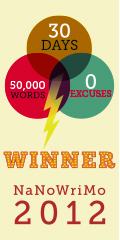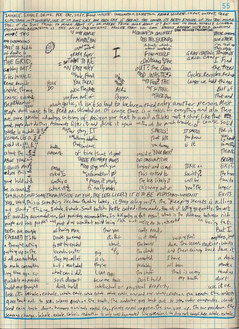 “Writing is a lonely job. Having someone who believes in you makes a lot of difference. They don't have to make speeches. Just believing is usually enough.”
― Stephen King
When you finish a story, who is the first person you ask to read it? When you get a rejection letter, who offers consolation and the encouragement you need to stuff another envelope and send it out again? In short, how strong is your support web?
Writing is by definition a solitary task. But humans are not always suited to be solitary creatures.
While most writers have a personal support system, the people who support us in life are not always the best at supporting us in our writing. It's not always that they don't try, but more likely they just don't have a clue what we really need.
In truth, we are not alone. There are plenty of other writers out there who are likely experiencing something similar in their writing lives as well. It's sometimes difficult to connect with them, but well worth the effort.
Writing circles, critiquing groups, conferences, or a one-on-one writing buddy are all great ways to connect with other writers who can provide support or just talk shop. While our writing is a solitary occupation, our writing lives don't have to be.
Spin a web and reach out to other writers. Build your support system strong and find greater support in reaching your goals.
Telling yourself you don't have time to write today is easy. Telling a writing buddy with a schedule more hectic than yours that you don't have time to write is not as simple. Avoiding that conversation can be great writing motivation.
 'Editors also know that the people who are really readers want to read. They hunger to read. They will forgive a vast number of clumsinesses and scamped work of every sort if the author will delight them just enough to keep them able to continue.'
-William Sloane
We all labor over our manuscripts with great care and diligence. We become captivated by our charactors and creatures; the tale we have conceived and given birth to; the story we have nurtured and developed and poured countless hours of our lives into. When it's finally done, and we have shed our tears of joy and sadness, we prepare to send it out into the world. But before we reach for that envelope - or in todays world, the submit button - we should all take a moment to stop and be sure we have done all we can to give our work the best possible chance of success when it must ultimately stand on its own.
I think we all fear that moment when our work leaves our hands, venturing out to find out if it can stand alone or not. In completing the manuscript, we complete a chapter of our writing lives.
Seven Circles is complete - almost. While it is for all practical purposes done, I can't help but feel it's just not finished. I can't put my finger on just what it is about the manuscript that is bothering me, I also can't get over the feeling that something about it is not quite right.
I wonder if it's just pre-submittal butterflies, or something real and substantial. While I dread doing yet another editing pass, I'm not comfortable submitting something that is sub-par in quality. It's the perfectionist curse I carry around within me. Or maybe it's just the writer in me fearing the possible rejection letter. Either way I'm in a vicious avoidance circle with my inner writer. It's frustrating as hell and I have got to break it soon.
So will I break down and send it out, or will I give in and open it back up?
Your guess is as good as mine at this point. I'll keep you updated.
 Each writer is born with a repertory company in his head and as you get older, you become more skillful casting them.
- Gore Vidal
Inside my head there currently reside around 15 boxes; Compartmentalized storage containers of unique design. Each one contains a unique story. It’s helpful for me to think of them this way. It’s an organizational thing.
Inside each box I lock up all of the characters, settings, plot lines, monsters, and ideas pertaining to individual stories that I’m either working on or preparing to work on soon. It’s a system that I have painstakingly worked out over many years. For the most part it works fairly well. My mind acts as a stage and each box holds a unique play and everything collected thus far for its production.
For some time now my story “Seven Circles” has occupied that stage. I’ve been holding daily rehearsals, preparing the story for opening night when it will be released for the public, known darkly as agents and publishers.
Each day I open the box, place the settings on the stage, queue the characters, rehearse the plot lines, and advance the story line. When the days rehearsal is complete, I pack it all back in its appropriate box, clearing the stage for normal life to resume. I don’t always close the box though. Sometimes I might have a spare moment or two that I didn’t expect when I can call out a character or two and work out a line of dialogue or a scene detail. It’s helpful to keep it all handy for just such an occasion.
The closed boxes generally just sit quietly and wait. Occasionally a pent up character will shout obscenities through the walls if my imagination wanders close by, or when I pass them over for rehearsal time on stage.
On rare occasions, and today was one of them, a story will escape from a box I have not opened and go running around my stage, wreaking havoc and demanding to be written. Things like the current story, outlines and schedules, deadlines and so on, mean nothing to a protagonist who has been locked in a mind-box for a sufficient amount of time. When a story is that ready to be written, I find myself with basically two choices:
I can pause my can pause my current manuscript, give in to the escapee’s demands, and write the intruding story.
– OR –
I can ignore it and watch progress on my current story grind to a halt due to the mayhem.
Today I tried a different approach. I tried to talk it back into its box. It was tantamount to trying to herd mice: frustrating and exhausting.
“Seven Circles” is nearly complete, but the current work of prepping it for designated readers has left my creative muse painfully idle. It’s taken to kicking boxes.
To make things worse, the rogue story is very clear in my mind. Its groundwork was laid sometime ago. It stands before me; body fully clothed; matured; with nearly all of its details worked out. I need but record it.
It’s a slippery slope, working on two different stories at the same time; alternating stage time; switching between boxes; changing out settings and scenery. I’ve done it before and found characters try to influence each others’ plot lines. They sneak into settings and circumstances not their own. As I said, it’s frustrating. Especially when they are dressed similarly.
I’ll let them both play today, but tomorrow I’m going to go buy some padlocks.
 “You grow ravenous. You run fevers. You know exhilarations. You can't sleep at night, because your beast-creature ideas want out and turn you in your bed. It is a grand way to live.”
― Ray Bradbury
Since the first of the year I’ve been on a bit of a break. Mostly I’ve been doing a little editing, catching up on some reading, and spending some time with my family. I sort of felt like I deserved a break after finishing NaNoWiMo in November, surviving the mayhem of the holidays, and negotiating a remarkably crazy January at work. I was tired and my mind just wanted to sleep; to shift gears and simply coast for a while.
Ever wake up from a deep sleep because you hear a dog barking? Everyone else in the house sleeps right through it, but you can't. It's impossible to slip back into blissful slumber until the animal stops, but it won't. So you just lie awake and listen to it.
Everyone needs a rest now and then. It’s good for the mind, body and spirit. But here it is, the beginning of March, and I’ve been “sleeping” for well over a month and that damn dog just won’t shut up. As much as I would like to roll over and doze back off, my mind only hears the dog. I know it’s not going to shut up until I get up and let it back in the house. After all, it is my dog.
 "I wish you a wrestling match with your Creative Muse that will last a lifetime. I wish craziness and foolishness and madness upon you. May you live with hysteria, and out of it make fine stories — science fiction or otherwise. Which finally means, may you be in love every day for the next 20,000 days. And out of that love, remake a world.”
― Ray Bradbury
It's a New Year once again and people are thinking about resolutions. I'm not, but some people are.
Instead of a resolution, I want to make a wish. Not just for me, but for every writer out there in the world, regardless of whether they are just beginning or have been writing for years and years:
Just as Bradbury did - I wish you madness (and all the writing bliss that accompanies it).
Write often and have a safe and happy holiday.
 The big secret is the ability to stay in the room. — Ron Carlson
There are days when staying in the room is indeed the most difficult part of writing. Life pounds on the door; thoughts scurry about in opposing directions; responsibilities shout through the walls, reminding us of forgotten or postponed duties; Imagination sits on a chair in the corner and laughs hysterically without muttering a word. It's difficult to shut out the distractions and simply concentrate on the writing.
But some days it isn't staying in the room that's difficult. For me getting into the room tends to be the hardest part.
I have an office. Once I sit down in it, writing becomes easier. It's noting fancy, just a spare bedroom that is no longer being used for sleeping. The desk is a very old table I bought at an auction. The chair was a Christmas present. I have several book shelves that my father gave me when he cleaned out his garage. They hold a mish-mash of reference and science fiction books, along with some classics. There are also old magazines, a set of encyclopedias, and way too many office supplies. The room doesn't look like much, but it's comfortable and it's conducive to writing. The biggest problem I have is walking up the stairs to get to it.
For years I dreamed of having a designated writing space; of being able to have a room completely dedicate to the sole task of creating. Over the years, I've written in the dining room, the living room, the bed room, the front porch, and occasionally the back yard and the car. It's difficult to stay focused when all the distractions of life are neatly displayed no matter where your gaze falls.The office was to be my sanctuary, my place to escape the world and all of the things in it that steal away bits of my attention and inspiration. This designated room minimizes those effects.
But going there, and sitting down in that chair, is sometimes more difficult than any other aspect of writing. It's like the creative monster in my mind dreads that place of order and business. The lack of non-writing related chew toys is frightening for a monster of such mythical proportions as my often maddening beast and muse, Chaos. It fights entering the room like the dog fights my attempts to put him in the bathtub. I try to make it an inviting place, but that isn't always enough. Chaos is very smart. The room means it's time to work. Monsters don't always like to work. At least my monster doesn't like to sometimes. There are claw marks on the door frame to prove it.
But writing isn't an occupation for the faint of heart. It's an obsession fueled by passion and commitment. It's a frame of mind that requires time and effort and sometimes a whip and a chair.
But when all else fails, it helps that I keep a big bowl of candy on my desk.
 One hasn't become a writer until one has distilled writing into a habit, and that habit has been forced into an obsession. Writing has to be an obsession. It has to be something as organic, physiological and psychological as speaking or sleeping or eating.
-Niyi Osundare
TGIO – The phrase of NaNo participants around the world today. “Thank God it’s over!”
Strangely enough I’m not chanting it. (Whispering it in the dark corners of my creepy subconscious – maybe, but definitely not shouting it from the rooftops.)
Going into the month of November, I had no idea what I was getting into. I thought it would be a nice change of pace and a break from my monotonous editing work on my current fantasy novel. I thought it would be fun. In all honesty, there were moments when it really was fun. There were moments when it really wasn’t as well.
I told myself if I got out 30,000 words I would be happy with my effort. After all, I was just going to hash out a rough draft; work up the bones for my next novel. One of the guidelines for NaNo is to turn off the inner editor and just freely write. After weeks of picking apart my current story line by line, parting company with my inner-editor was holding massive appeal to me. I was having no difficulty at all with the idea spending 30 days on my own with my writing and a crude outline of a story that had been rippling the water of my imagination for nearly a year now while its older sibling enjoyed the lime light of my undivided attention. At least in that
respect I was right. It was a fantastic diversion.
But at 11:27 pm last night (Nov. 30), when I closed my file at 50,106 words, the only thing I experienced was relief. I immediately went on line and had the manuscript validated by the NaNoWriMo website, which brought me to a strange little video of a bunch of strangers congratulating me. It was good they were there because the rest of my house was sound asleep, including the dog. It would have felt odd to celebrate alone.I had finished the challenge and it felt good.
This morning I sat down once again at my computer, as you can see, and began to ask myself: What did I learn this month? I just spent 30 days working on a story that very likely will get little if any attention for at least another month or two while I go back to wrapping up my ‘Seven Circles’ manuscript. Was it ultimately worth it?
My answer: YES
I’ve written almost every day this month, with the exception of a couple of days around Thanksgiving when we had family in from out of state. Other than that, I’ve developed a writing time nearly every evening, for around two hours. The more often I indulged, the easier it got. I’ve developed a much more stable writing habit. And with the end counted down for me - day by day - I was able to stay focused on the work and the story that was unfolding before me. So while I didn’t get to a lot of write-ins and only got to meet about six other participants, I did improve my writing habit and now have 50,106 words towards completing my next novel. Not a bad take for the month.
Will I do it again next year? I can’t say for certain, but I think I might.
 "I write for the same reason I breath - because if I didn't, I would die."
- Isaac Asimov
I don't know for certain, but I suspect that every great writer feels this pull, at least from time to time. It's a feeling akin to tightness in the chest, combined with a racing of the mind and a maddening of the intellect as well as the spirit. Once the story, or the thought, or the emotion, idea, or image takes hold of the mind, there is no denying the impulse, the raw and carnal need, to express the mind's obsession before any hope of calmness or ordinary life can return. To deny the urge is paramount to denying the body air.
It is a maddening feeling to experience an unsolicited need so great as that call from within to write. There is also no greater feeling than to answer that call and find the rewards of the labors to be spectacular in their completed form.
I feel, at least for myself, it is an addiction; a need that manifests itself in both physical and psychological forms. Certainly it can take over a life just the same as an addiction to alcohol or drugs. Allowed to reach obsessive proportions, it can even do as much damage. Yet to be successful each writer must come to terms with it. Welcoming it into our lives and accepting it as a natural part of what makes us uniquely who we are.
For me being a writer has never really been a choice. Even when I tried to deny it, swore off it cold turkey, I could never beat the addiction. I was miserable in my life and in my mind and soul. I went through days, weeks and months trying to understand life without the release of thought upon paper. It was hell.
To this day I still don't understand how non-writers survive in this world. I have to write. It is my happiness, my sanity, my vice, my passion and my desire. It is my air.
 Either marry your work – take it seriously and do it every day – or date it – write only when you feel like it – but know which you are doing and the repercussions of both.
- Anonymous
“Hey, you busy tomorrow night? You want to get together for a couple of hours, have some fun?”
- Or -
“To have and to hold, from this day forward, for better, for worse, for richer, for poorer, in sickness and in health, until death do us part.”
Which relationship am I in? Well, for about 25 years we dated. I was in love with writing, but I just couldn’t bring myself to commit. It was fun and all, but I always let other things come between us. Writing had other ideas though, and I eventually came to a point in my life when I had to choose. I stopped writing –cold turkey – and tried to live my life without it.
It’s hard to break a lifelong addiction though, and my will power sucks: I caved within a week. My family and friends all thought I was nuts but I realized I just couldn’t live without Writing in my life if I wanted to stay sane. It was time to get serious and take the plunge.
The ring was cheap - a box of pens and about two hundred sheets of paper; The engagement was short - less than a week; The honeymoon was about 20,000 words long, and we went to a truly magical and beautiful place.
Then the glitter wore off and reality set in. It was difficult at first – learning to live with one another day in and day out – but in time we began to work things out. Just like a spouse, Writing requires dedication and commitment. It’s work, real work. It might come easier to some than to others, but it still requires great attention and diligence, just like a marriage. You have to work on it every day, whether you’re in the mood or not. Just like a marriage too, you get out what you put in.
It’s easy to write.
It’s hard to write well.
It’s even harder still to write skillfully.
Take the time to be honest with yourself and with your writing. Know why you do it and what you expect to get out of it. The more honest you can be, the better the chances you will have a long and happy relationship, whether you just date or you wear a ring.
 'The primary distinction of the artist is that he must actively cultivate that state which most men, necessarily, must avoid: the state of being alone.'
— James Baldwin
When I write, I write alone. All writers do. It’s a prerequisite of the trade. My characters and my stories live in my head. It’s a big place, lots of crazy stuff going on in there I know, but it’s only big enough for one. The idea of writing one of my own stories as part of a collective project is a rather strange concept for me.
I try to be open to new opportunities and new ways to learn and improve my writing skills. With this in mind, I have decided to do NaNoWriMo this year. While I have never done it before, I’ve heard it’s a good exercise to get the writing juices flowing. Seeing as how I haven’t been as productive as I’d like to be lately, I thought it might be just the thing to motivate me to keep my fingers on the keys. (Not to mention it seems a good place to get connected with a writing community in my area.)
If you’ve done it, you already know more than me. If you haven’t, then here is the link to the site and you can learn all about it there:
http://www.nanowrimo.org/
I think I need a break from my 'Seven Circles of Heil' story. I suspect a month away from it might be just the thing to rejuvenate my efforts at finishing it. While progress is still crawling along, I’ve realized that I’m just getting sick of it. Not the story mind you, but looking at it day in and day out. I’ve gotten to the point of editing where I’m doing it almost line by line, tying up all threads, item by item. It’s got to be done, but it’s tedious. It might be nice to step back for a few weeks and come December, see it with “Fresh Eyes,” so to speak.
Then again maybe this is just another well camouflaged act of avoidance.
Either way I’m excited about starting NaNo.
Anyone out there ever done it? How did it work out for you? What did you take away from it when it was over? Let me know if you would, I’m really interested.
|










 RSS Feed
RSS Feed